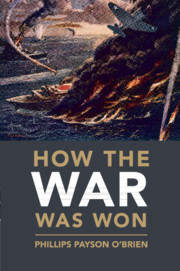Book contents
- Frontmatter
- Contents
- List of Figures
- List of Maps
- List of Tables
- Acknowledgments
- List of Abbreviations
- Map 1
- Map 2
- Map 3
- Map 4
- Map 5
- Map 6
- Map 7
- Map 8
- Introduction
- 1 The dominance of air and sea production
- 2 The air and sea war and the phases of equipment destruction
- 3 The air and sea war to November 1940
- 4 Grand strategists and the air and sea war
- 5 Understanding the air and sea war from December 1940 to March 1942
- 6 Grand strategy in action: prioritizing the air and sea war
- 7 Winning the shipping war
- 8 The war in Europe in 1943: strategic bombing and the land war
- 9 The war in Europe in 1944
- 10 The air and sea war against Japan, 1942–4
- 11 The end of the war
- Conclusion: the supremacy of air and sea power and the control of mobility
- Notes
- Select bibliography
- Index
Introduction
Published online by Cambridge University Press: 05 February 2015
- Frontmatter
- Contents
- List of Figures
- List of Maps
- List of Tables
- Acknowledgments
- List of Abbreviations
- Map 1
- Map 2
- Map 3
- Map 4
- Map 5
- Map 6
- Map 7
- Map 8
- Introduction
- 1 The dominance of air and sea production
- 2 The air and sea war and the phases of equipment destruction
- 3 The air and sea war to November 1940
- 4 Grand strategists and the air and sea war
- 5 Understanding the air and sea war from December 1940 to March 1942
- 6 Grand strategy in action: prioritizing the air and sea war
- 7 Winning the shipping war
- 8 The war in Europe in 1943: strategic bombing and the land war
- 9 The war in Europe in 1944
- 10 The air and sea war against Japan, 1942–4
- 11 The end of the war
- Conclusion: the supremacy of air and sea power and the control of mobility
- Notes
- Select bibliography
- Index
Summary
There were no decisive battles in World War II. This might seem a strange thing to say as the war is usually viewed through the prism of its famous engagements. As this book was being completed, the seventieth anniversaries of El Alamein, Stalingrad, Kursk and Midway have been remembered. It has led to a great deal of reflection on this pivotal period of the war. Each battle is usually discussed with superlatives which invariably include how it changed the course of the war or was responsible for leading the Allies to victory.
El Alamein, the famous tank battle in the Egyptian desert in October and November 1942, between Bernard Montgomery's British 8th Army and Erwin Rommel's Afrika Corps, is most remembered in the United Kingdom and parts of what was the British Empire. The destruction of most of Rommel's panzers, which started the German retreat from North Africa that would culminate in the surrender of a large German force in Tunisia in May 1943, is depicted as a crucial marker heralding German defeat. In the words of Winston Churchill, it may not have represented the beginning of the end, but it was “the end of the beginning.” Later he would say that before El Alamein the British never had a victory, and after they never had a defeat.
- Type
- Chapter
- Information
- How the War Was WonAir-Sea Power and Allied Victory in World War II, pp. 1 - 16Publisher: Cambridge University PressPrint publication year: 2015



